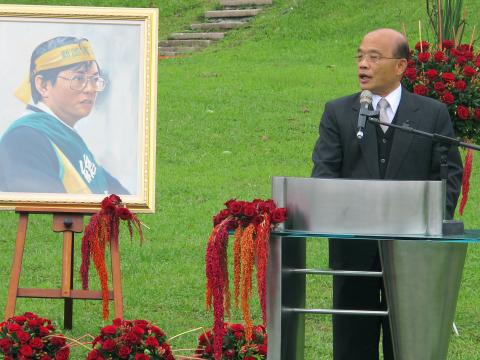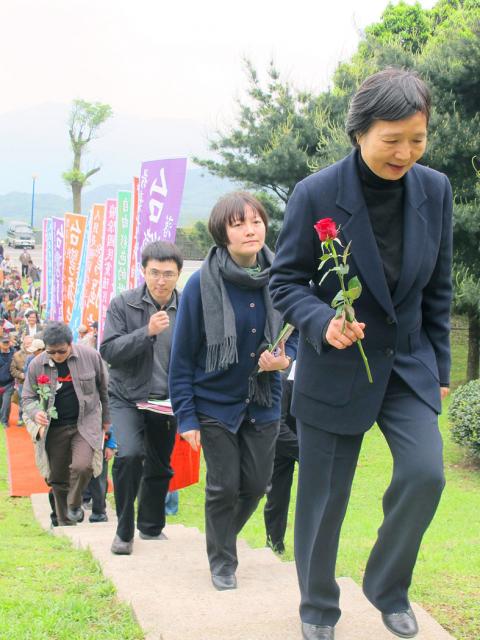Democratic Progressive Party (DPP) Chairman Su Tseng-chang (蘇貞昌) yesterday said that freedom in Taiwan has regressed since “a repressive government” had returned to power.
Su made the remarks at a ceremony in honor of Deng Nan-jung (鄭南榕), the late democracy advocate who set himself on fire 24 years ago and died in defense of “100 percent freedom of expression.”
The event took place at Deng’s tomb in New Taipei City’s (新北市) Jinbaoshan Cemetery in the morning.

Photo: Yu Chao-fu, Taipei Times
Su said it was a hard journey for Taiwanese to win the right of freedom of speech and it was made possible by people like Deng, who sacrificed himself.
Saying that 24 years ago there was no freedom in Taiwan under the then-authoritarian Chinese Nationalist Party (KMT) government, Su said people who had suffered from political repression or harassment knew that “certain words are said at home, not outside, or you could disappear or be caught anytime.”
However, Deng did not keep his mouth closed due to fear or threats, instead he spoke out, Su said.

Photo: Yu Chao-fu, Taipei Times
Deng spoke out not only with his mouth, but also by publishing his writings, he said.
He added that although Deng’s magazine Freedom Era Weekly (自由時代週刊) was banned, and permission for publishing the weekly was suspended again and again, he reapplied repeatedly and never gave up his intention in pursue democracy and freedom for the country.
Deng requested the authoritarian government to lift martial law, mark Feb. 28 an official memorial day for the 228 Massacre, and asked for a total freedom of expression, Su said.
He added that the KMT’s seizure, investigation, detention and imprisonment of Deng was intended to challenge his determination.
However, the KMT did not succeed, and it charged him with treason.
“Twenty-four years later, as we enjoy democracy and freedom of expression, we should not forget Deng’s spirit and the difficult road we have traveled,” Su said.
“After we have democracy, people voted for the then-authoritarian governors and allowed them to retain their power,” Su said.
Now they used more delicate and sophisticated ways to oppress freedom and democracy, Su said.
Freedom in Taiwan has been regressing since the KMT returned to power in 2008, and the US-based Freedom House has also said that freedom of the press in Taiwan has regressed, Su said.
Government propaganda is brainwashing people by saying that everything in China is good, while everything Taiwanese is bad, Su said.
Dealing with the situation, “people should appreciate what we own and learn to make right judgements,” Su added.
Born in Taiwan in 1947 to a family from China, Deng on numerous occasions in the 1980s overtly articulated his support for Taiwanese independence, at a time when a charge of sedition was in place to indict proponents of independence.
He established Freedom Era Weekly in 1984.
On April 7, 1989, he set himself on fire as heavily armed police attempted to break into his Taipei office, where he had barracaded himself for 71 days after he was charged with sedition for his magazine’s anti-government stance and for publishing a draft “Republic of Taiwan constitution” in 1988.

An apartment building in New Taipei City’s Sanchong District (三重) collapsed last night after a nearby construction project earlier in the day allegedly caused it to tilt. Shortly after work began at 9am on an ongoing excavation of a construction site on Liuzhang Street (六張街), two neighboring apartment buildings tilted and cracked, leading to exterior tiles peeling off, city officials said. The fire department then dispatched personnel to help evacuate 22 residents from nine households. After the incident, the city government first filled the building at No. 190, which appeared to be more badly affected, with water to stabilize the

Taiwan plans to cull as many as 120,000 invasive green iguanas this year to curb the species’ impact on local farmers, the Ministry of Agriculture said. Chiu Kuo-hao (邱國皓), a section chief in the ministry’s Forestry and Nature Conservation Agency, on Sunday said that green iguanas have been recorded across southern Taiwan and as far north as Taichung. Although there is no reliable data on the species’ total population in the country, it has been estimated to be about 200,000, he said. Chiu said about 70,000 iguanas were culled last year, including about 45,000 in Pingtung County, 12,000 in Tainan, 9,900 in

DEEPER REVIEW: After receiving 19 hospital reports of suspected food poisoning, the Taipei Department of Health applied for an epidemiological investigation A buffet restaurant in Taipei’s Xinyi District (信義) is to be fined NT$3 million (US$91,233) after it remained opened despite an order to suspend operations following reports that 32 people had been treated for suspected food poisoning, the Taipei Department of Health said yesterday. The health department said it on Tuesday received reports from hospitals of people who had suspected food poisoning symptoms, including nausea, vomiting, stomach pain and diarrhea, after they ate at an INPARADISE (饗饗) branch in Breeze Xinyi on Sunday and Monday. As more than six people who ate at the restaurant sought medical treatment, the department ordered the

ALLEGED SABOTAGE: The damage inflicted by the vessel did not affect connection, as data were immediately rerouted to other cables, Chunghwa Telecom said Taiwan suspects that a Chinese-owned cargo vessel damaged an undersea cable near its northeastern coast on Friday, in an alleged act of sabotage that highlights the vulnerabilities of Taipei’s offshore communications infrastructure. The ship is owned by a Hong Kong-registered company whose director is Chinese, the Financial Times reported on Sunday. An unidentified Taiwanese official cited in the report described the case as sabotage. The incident followed another Chinese vessel’s suspected involvement in the breakages of data cables in the Baltic Sea in November last year. While fishing trawlers are known to sometimes damage such equipment, nation states have also